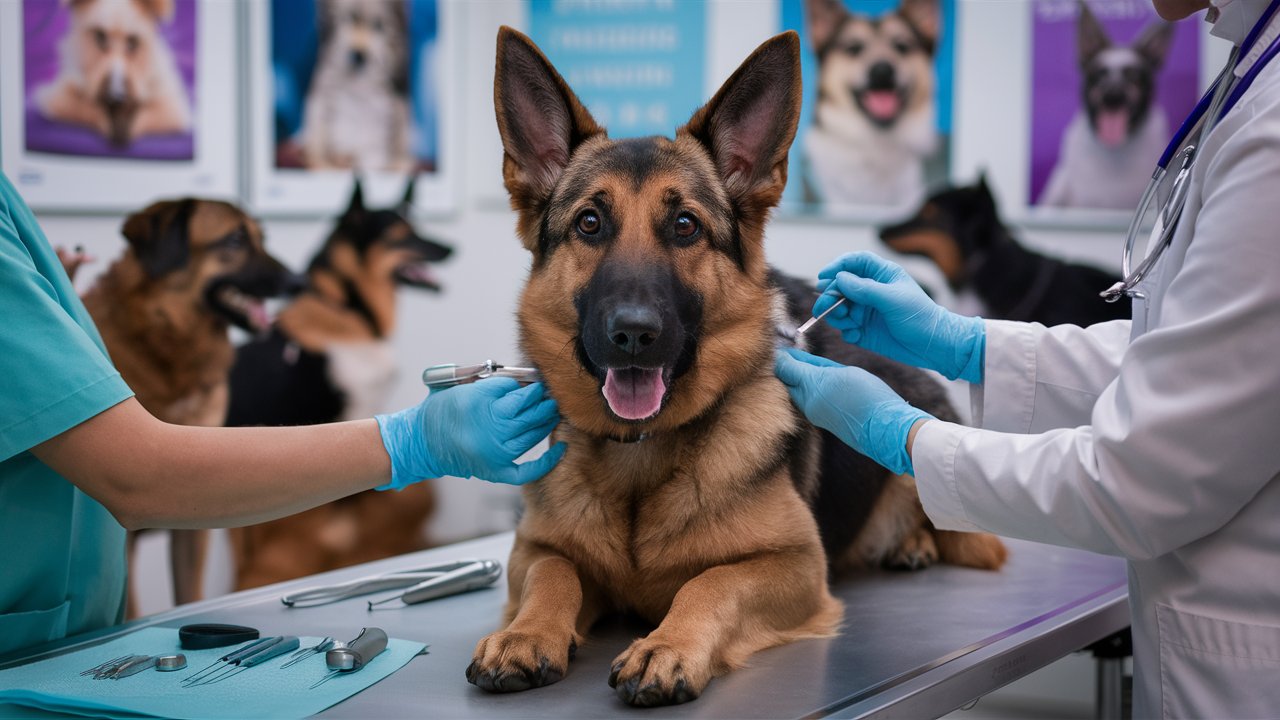100% German Shepherd Health: Comprehensive Crucial Diseases, Prevention, and Treatment
German Shepherds are renowned for their intelligence, loyalty, and versatility, making them one of the most popular dog breeds worldwide. However, like all breeds, German Shepherds are susceptible to certain health issues. In this comprehensive guide, we will delve into the common diseases that affect German Shepherds, discuss prevention strategies, and explore treatment options. By understanding these German Shepherd Health concerns, you can ensure your beloved companion lives a healthy and fulfilling life.

Table of Contents
- Introduction
- Why Understanding German Shepherd Health is Important
- Overview of Common Diseases
- Hip Dysplasia
- What is Hip Dysplasia?
- Symptoms and Diagnosis
- Prevention and Treatment
- Elbow Dysplasia
- Understanding Elbow Dysplasia
- Identifying Symptoms
- Managing and Treating the Condition
- Degenerative Myelopathy
- What is Degenerative Myelopathy?
- Early Signs and Progression
- Coping with Degenerative Myelopathy
- Exocrine Pancreatic Insufficiency (EPI)
- An Overview of EPI
- Recognizing Symptoms
- Treatment and Management
- Bloat (Gastric Dilatation-Volvulus)
- What Causes Bloat?
- Symptoms to Watch For
- Prevention and Emergency Treatment
- Epilepsy
- Understanding Canine Epilepsy
- Identifying Seizures
- Treatment Options and Management
- Hemophilia
- What is Hemophilia?
- Symptoms and Diagnosis
- Managing Hemophilia in German Shepherds
- Allergies
- Common Allergens
- Symptoms of Allergies
- Prevention and Treatment
- Von Willebrand Disease
- Understanding Von Willebrand Disease
- Diagnosing the Condition
- Treatment and Management
- Pannus (Chronic Superficial Keratitis)
- What is Pannus?
- Symptoms and Diagnosis
- Treatment Options
- Personal Anecdotes and Stories
- Real-life Stories from German Shepherd Owners
- Lessons Learned and Tips
- Conclusion
- Summary of Key Points
- Final Thoughts on German Shepherd Health

1. Introduction
Why Understanding German Shepherd Health is Important
Owning a German Shepherd comes with immense joy and responsibility. These loyal companions require not only love and training but also a keen awareness of their health needs. Understanding the common diseases that affect German Shepherds can help you take proactive measures to prevent or manage these conditions, ensuring your dog remains healthy and happy.
Overview of Common Diseases About German Shepherd Health
German Shepherds are prone to various health issues, some of which are hereditary while others may be influenced by environmental factors. This guide will cover the most common diseases, providing detailed information on symptoms, prevention, and treatment. By being informed, you can work closely with your veterinarian to keep your German Shepherd in optimal health.
2. Hip Dysplasia
What is Hip Dysplasia?
Hip dysplasia is a genetic condition where the hip joint does not fit properly into the hip socket. This misalignment can cause pain, inflammation, and eventually arthritis. It is one of the most common orthopedic issues in German Shepherds.
Symptoms and Diagnosis
Symptoms of hip dysplasia can vary but often include:
- Limping or favoring one hind leg
- Difficulty rising or lying down
- Decreased activity or reluctance to exercise
- Pain or discomfort when the hip area is touched
Diagnosis typically involves a physical examination and radiographs (X-rays) to assess the condition of the hip joint.
Prevention and Treatment
While hip dysplasia is hereditary, certain measures can help reduce the risk or severity:
- Weight Management: Maintaining a healthy weight reduces stress on the joints.
- Exercise: Regular, low-impact exercise helps maintain muscle strength and joint flexibility.
- Nutrition: Providing a balanced diet with appropriate levels of calcium and phosphorus is crucial.
Treatment options vary based on the severity of the condition:
- Medications: Anti-inflammatory drugs and pain relievers can help manage symptoms.
- Physical Therapy: Exercises and therapies such as hydrotherapy can improve joint function.
- Surgery: In severe cases, surgical options like hip replacement or femoral head ostectomy may be considered.
3. Elbow Dysplasia
Understanding Elbow Dysplasia
Elbow dysplasia is another common orthopedic condition in German Shepherds. It involves multiple developmental abnormalities in the elbow joint, leading to joint instability and arthritis.
Identifying Symptoms
Common symptoms include:
- Lameness in the front legs
- Stiffness, especially after rest
- Swelling around the elbow
- Decreased range of motion
Managing and Treating the Condition about German Shepherd Health
Management and treatment strategies for elbow dysplasia include:
- Weight Control: Keeping your dog at a healthy weight to minimize joint stress.
- Exercise: Providing controlled, low-impact exercise.
- Medications: Using anti-inflammatory medications to manage pain and inflammation.
- Surgery: In severe cases, surgical intervention may be necessary to correct the abnormalities.
4. Degenerative Myelopathy
What is Degenerative Myelopathy?
Degenerative myelopathy (DM) is a progressive spinal cord disease that affects older German Shepherds. It leads to the gradual loss of coordination and mobility.
Early Signs and Progression
Early signs of DM include:
- Weakness in the hind legs
- Dragging of the hind feet
- Difficulty standing or walking
As the disease progresses, it can lead to complete paralysis of the hind legs.
Coping with Degenerative Myelopathy
While there is no cure for DM, management strategies can improve quality of life:
- Physical Therapy: Exercises and therapies to maintain muscle strength.
- Assistive Devices: Using harnesses or carts to aid mobility.
- Medications: Although there are no specific treatments for DM, medications may help manage symptoms.
5. Exocrine Pancreatic Insufficiency (EPI)

An Overview of EPI
EPI is a condition where the pancreas fails to produce enough digestive enzymes, leading to malabsorption of nutrients. German Shepherds are particularly prone to this condition.
Recognizing Symptoms
Symptoms of EPI include:
- Chronic diarrhea
- Weight loss despite a good appetite
- Poor coat condition
- Increased hunger
Treatment and Management
EPI is managed through:
- Enzyme Supplements: Adding pancreatic enzyme supplements to your dog’s food.
- Diet: Feeding a highly digestible, low-fiber diet.
- Regular Monitoring: Regular vet check-ups to monitor the condition and adjust treatment as needed.
6. Bloat (Gastric Dilatation-Volvulus)
What Causes Bloat?
Bloat, or gastric dilatation-volvulus (GDV), is a life-threatening condition where the stomach fills with gas and twists on itself. It can cut off blood supply and cause rapid deterioration.
Symptoms to Watch For
Symptoms of bloat include:
- Distended abdomen
- Unproductive retching
- Restlessness and discomfort
- Rapid breathing and heart rate
Prevention and Emergency Treatment
Preventing bloat involves:
- Feeding Practices: Feeding smaller, more frequent meals and avoiding vigorous exercise after eating.
- Preventive Surgery: In high-risk dogs, a gastropexy surgery can be performed to anchor the stomach and prevent twisting.
Emergency treatment requires immediate veterinary care to decompress the stomach and stabilize the dog. Surgery is often necessary to correct the torsion.
7. Epilepsy
Understanding Canine Epilepsy
Epilepsy is a neurological disorder that causes recurrent seizures. It can be idiopathic (no known cause) or secondary to other conditions.
Identifying Seizures
Seizures can manifest as:
- Convulsions
- Staring or loss of consciousness
- Muscle twitching
- Drooling or foaming at the mouth
Treatment Options and Management
Managing epilepsy involves:
- Medications: Anti-seizure medications such as phenobarbital or potassium bromide.
- Monitoring: Regular vet visits to monitor medication levels and adjust dosages.
- Lifestyle Adjustments: Maintaining a stress-free environment and regular routine.
8. Hemophilia
What is Hemophilia?
Hemophilia is a genetic bleeding disorder where the blood does not clot properly. It is less common but can occur in German Shepherds.
Symptoms and Diagnosis
Symptoms include:
- Prolonged bleeding from minor injuries
- Spontaneous bleeding into joints or muscles
- Bruising easily
Diagnosis is confirmed through blood tests that evaluate clotting factors.
Managing Hemophilia in German Shepherds
Management strategies include:
- Avoiding Trauma: Preventing injuries that could cause bleeding.
- Medications: Using clotting factor concentrates or other medications to manage bleeding episodes.
- Regular Vet Care: Close monitoring and regular check-ups with your veterinarian.
9. Allergies
Common Allergens
German Shepherds can suffer from allergies, which may be triggered by:
- Food ingredients
- Environmental factors (pollen, dust mites)
- Flea bites
Symptoms of Allergies
Allergy symptoms include:
- Itching and scratching
- Red, inflamed skin
- Ear infections
- Gastrointestinal issues (in food allergies)
Prevention and Treatment
Managing allergies involves:
- Identifying Triggers: Working with your vet to determine the cause of the allergy.
- Medications: Using antihistamines or corticosteroids to manage symptoms.
- Diet: Providing a hypoallergenic diet if food allergies are suspected.
10. Von Willebrand Disease
Understanding Von Willebrand Disease
Von Willebrand Disease (vWD) is a genetic disorder that affects the blood’s ability to clot. It is similar to hemophilia but involves a different clotting factor.
Diagnosing the Condition
Diagnosis involves blood tests to measure levels of von Willebrand factor and assess clotting function.
Treatment and Management
Management includes:
- Avoiding Injury: Preventing situations that could lead to bleeding.
- Medications: Using medications to promote clotting during bleeding episodes.
- Surgical Precautions: Taking special care during surgical procedures to prevent excessive bleeding.
11. Pannus (Chronic Superficial Keratitis)
What is Pannus?
Pannus is an immune-mediated eye condition that causes inflammation of the cornea. It is prevalent in German Shepherds and can lead to vision impairment.
Symptoms and Diagnosis
Symptoms include:
- Redness and cloudiness of the eye
- Thickening of the cornea
- Vision loss in severe cases
Diagnosis is made through a thorough eye examination by a veterinarian.
Treatment Options
Treatment involves:
- Medications: Using topical steroids or immunosuppressive drugs to control inflammation.
- UV Protection: Minimizing exposure to UV light by using doggy sunglasses or keeping your dog indoors during peak sunlight hours.
- Regular Monitoring: Regular check-ups with your vet to monitor the condition and adjust treatment as needed.
12. Personal Anecdotes and Stories About German Shepherd Health

Real-life Stories from German Shepherd Owners
To make this guide more relatable and engaging, let’s explore some personal stories from German Shepherd owners who have dealt with these health issues. These anecdotes highlight the challenges and triumphs of managing common German Shepherd Health diseases and provide insights that can help other owners navigate similar situations.
Story 1: Living with Hip Dysplasia
“My German Shepherd Health, Max, was diagnosed with hip dysplasia at the age of two. It was heartbreaking to see him struggle with mobility issues at such a young age. Max had always been an active dog, full of energy and enthusiasm, so watching him limp and hesitate to move was difficult. Our vet explained the condition and the importance of weight management, proper exercise, and joint supplements. We started him on a regimen of glucosamine and chondroitin, which helped support his joint health. Additionally, we enrolled him in a canine physical therapy program, which included hydrotherapy sessions. The water exercises were fantastic for Max; he could build muscle without putting too much strain on his joints.
Story 2: Coping with Epilepsy
“Sasha, my German Shepherd, began having seizures when she was three years old. It was a terrifying experience, and I felt completely helpless the first time it happened. We rushed her to the vet, where she was diagnosed with idiopathic epilepsy. The vet prescribed anti-seizure medications, and we had to go through a period of trial and error to find the right dosage and combination of drugs that worked for her. It required a lot of patience and close monitoring, but eventually, we found a regimen that significantly reduced the frequency and severity of her seizures. Living with an epileptic dog required adjustments and vigilance.
Story 3: Managing Degenerative Myelopathy
“When my German Shepherd Health, Luna, started showing signs of weakness in her hind legs, I initially thought it was just due to old age. However, as her condition worsened, our vet diagnosed her with degenerative myelopathy. The prognosis was daunting, as DM is a progressive disease with no cure. However, our vet suggested a management plan to slow the progression and improve her quality of life. This included a combination of physical therapy, nutritional supplements, and assistive devices like a rear harness to help her walk. We also made changes around the house, such as installing ramps and non-slip mats, to make it easier for Luna to move around.
Story 4: Overcoming Exocrine Pancreatic Insufficiency (EPI)
“Our German Shepherd Health, Bella, was always a bit on the lean side, but when she started losing weight rapidly despite having a voracious appetite, we knew something was wrong. After several tests, our vet diagnosed her with Exocrine Pancreatic Insufficiency (EPI). The condition meant Bella’s pancreas wasn’t producing enough enzymes to digest her food properly. The diagnosis was overwhelming, but our vet reassured us that with proper management, Bella could lead a healthy life. We began adding pancreatic enzyme supplements to her meals, which made a significant difference. We also switched her to a highly digestible, low-fiber diet. Bella’s weight stabilized, and her energy levels improved.
Story 5: Handling Allergies
“My German Shepherd Health, Duke, developed severe skin allergies when he was about four years old. It started with constant scratching and progressed to red, inflamed skin and recurring ear infections. Our vet performed allergy tests and determined that Duke was allergic to several environmental factors, including pollen and dust mites. We started him on a regimen of antihistamines and corticosteroids to manage his symptoms. Additionally, we made changes at home to reduce his exposure to allergens, such as using air purifiers and regularly washing his bedding. We also switched him to a hypoallergenic diet, which helped alleviate some of his gastrointestinal issues.
German Shepherd Health Lessons Learned and Tips
From these stories, several key lessons emerge:
- Early Detection: Regular vet check-ups and being observant of changes in your dog’s behavior or health can lead to early detection and more effective management of health issues.
- Proactive Management: Following your vet’s recommendations on diet, exercise, and treatment plans can significantly improve your dog’s quality of life.
- Support Networks: Connecting with other dog owners facing similar challenges can provide emotional support and practical advice.
- Adaptability: Being prepared to make adjustments to your dog’s lifestyle and your home environment can make a significant difference in managing chronic conditions.
- Resilience: Dogs, like humans, have a remarkable ability to adapt to health challenges with the right support and care.
13. Conclusion
Summary of Key Points
German Shepherds are incredible companions, but they are also prone to certain health issues. By understanding common diseases such as hip dysplasia, elbow dysplasia, degenerative myelopathy, EPI, bloat, epilepsy, hemophilia, allergies, von Willebrand disease, and pannus, you can take proactive steps to prevent, manage, and treat these conditions. Regular veterinary care, a healthy lifestyle, and being observant of your dog’s health are crucial in ensuring a long, happy life for your German Shepherd.
German Shepherd Health Final Thoughts
Owning a German Shepherd is a rewarding experience, filled with love, loyalty, and companionship. By staying informed about potential health issues and working closely with your veterinarian, you can provide the best possible care for your furry friend. Remember, early detection and proactive management are key to addressing health concerns and maintaining your dog’s well-being. With the right care, your German Shepherd can continue to be a loyal and healthy member of your family for many years to come This is very important to German Shepherd Health Care.





